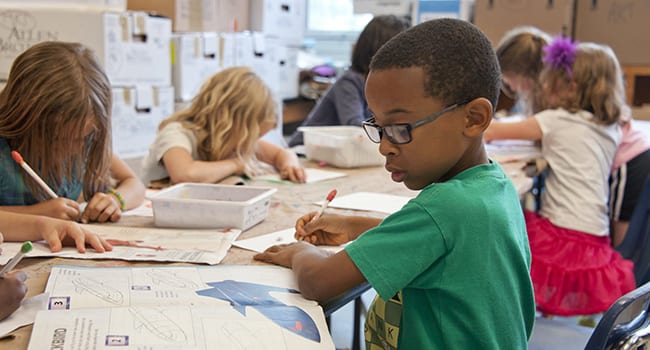 Many parents are frustrated by the limited educational choices their children have right now.
Many parents are frustrated by the limited educational choices their children have right now.
For example, a recent article in the Calgary Herald (“Parents regretting in-person classes with no options to go online”), suggests that parents are concerned about sending their children to school. They’re equally concerned by the lack of spaces in online courses if schools close down.
Across Canada, school divisions have set up two teaching modes: in-school classes and online classes. Before the COVID-19 pandemic, virtually all students were enrolled in in-school courses with only a few students taking online courses.
The situation changed dramatically this fall.
In-school courses are now structured much differently than they were before the pandemic. Students are required to maintain social distance and, in most provinces, are required to wear masks throughout the day.
Some students have great difficulty doing these things for a number of reasons, including their age, maturity and various medical conditions.
No doubt, these two educational options sounded good when they were proposed early in the summer. But now that students are in class, their experiences are showing serious weaknesses in both options.
In the first month of school alone, at least 37 schools in Calgary – and over 120 in Alberta – had COVID-19 outbreaks. When this happens, schools are closed and students and teachers are forced to isolate themselves, usually at home. Now all Alberta students from Grades 7 to 12 are working from home, at least until after an extended Christmas break.
Not surprisingly, parents are asking school administrators how their children can continue their education when schools close.
Of course, parents are also wondering how they will care for their children when they’re working. This is a very serious concern for parents who work outside the home.
But there’s another option that hasn’t been examined: home-schooling.
Home-schooling, of course, works best when at least one parent is at home and can spend educational time with the children. But this arrangement seems impossible for parents, like nurses and police officers, who have shift work outside the home.
Under such conditions, parents in some communities have set up neighbourhood schools, in which a group of families put their children into a bubble for homeschooling. In some of these neighbourhood schools, parents have even hired tutors to teach courses in mathematics and languages because they don’t feel proficient in these subjects.
Provincial governments and school boards should be helping parents with this option. Since taxpayers – including the parents themselves – have paid for the education their children were scheduled to receive, the school boards and the provincial governments should help parents create neighbourhood schools.
At the very least, school boards could reimburse parents for the additional costs of educating their children while their in-school courses are shut down. Well-educated tutors for math, science and language arts would cost about $30 to $40 an hour or about $160 for a four-hour school day. School boards should pay for this tutoring service for children who can’t attend in-school courses and can’t enrol in online courses.
There has been substantial research, especially in the U.S., on the effectiveness of home-schooling. These studies show that home-schooled children do at least as well on standardized exams as in-school students. In fact, in a number of studies, home-schooled children do better than in-school students.
Home-schooled children tend to do better in social studies, languages and geography, but not as well in math and science courses. For this reason, parents may want to hire tutors for courses they feel less proficient in teaching.
Equally important, there’s no evidence that home-schooled children suffer from emotional or social problems at greater rates than in-school students. In fact, the research suggests that home-schooled children are, on average, better adjusted and more emotionally mature than in-school students of the same age.
Generally, this research shows that the traditional in-school option is not necessarily the gold standard that many parents seem to think it is. In fact, many home-schooling parents subscribe to online learning programs that are better structured than the lesson plans used by most in-school teachers.
It is time for provincial governments, school boards and provincial home-schooling associations to help parents ensure that their children’s education can continue when schools are closed because of the COVID-19 outbreaks. These agencies can provide many resources to parents and tutors.
To make home-schooling a viable option, political action is needed. It’s time for provincial governments to step forward and make this option available for parents and their children.
Rodney Clifton is a professor emeritus at the University of Manitoba and a senior fellow at the Frontier Centre for Public Policy.
Rodney is a Troy Media Thought Leader. Why aren’t you?
For interview requests, click here. You must be a Troy Media Marketplace media subscriber to access our Sourcebook.
The views, opinions and positions expressed by columnists and contributors are the author’s alone. They do not inherently or expressly reflect the views, opinions and/or positions of our publication.


